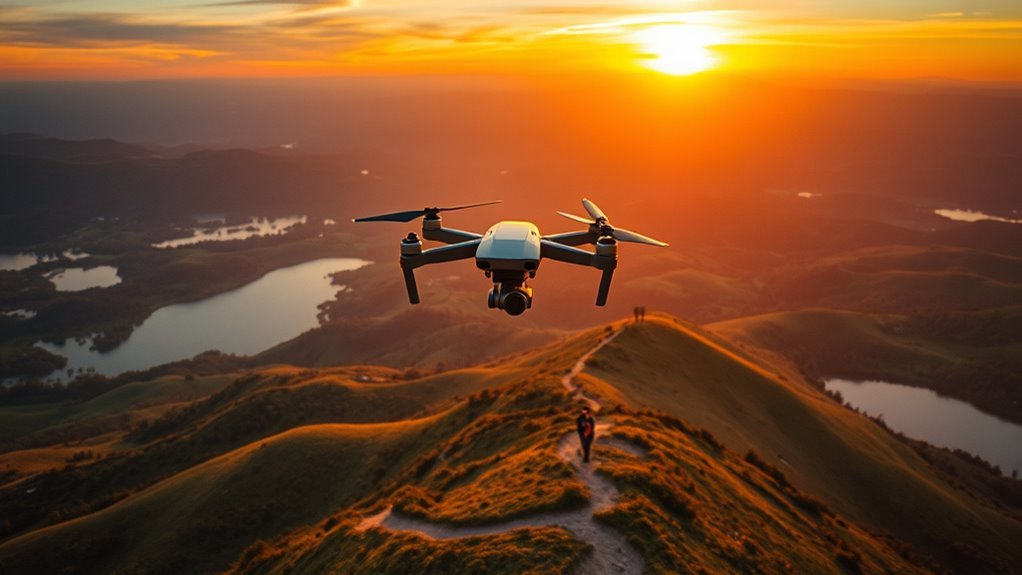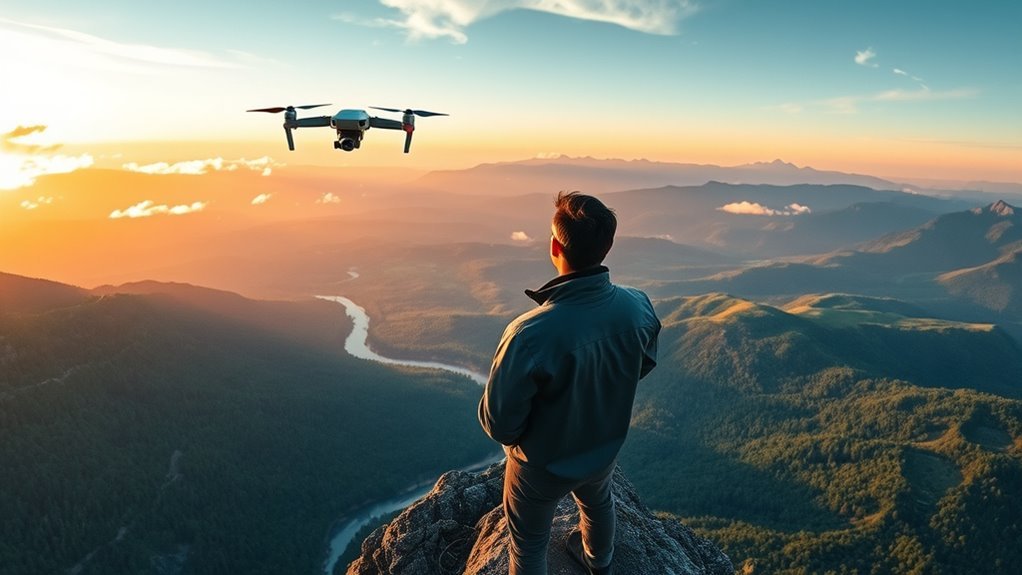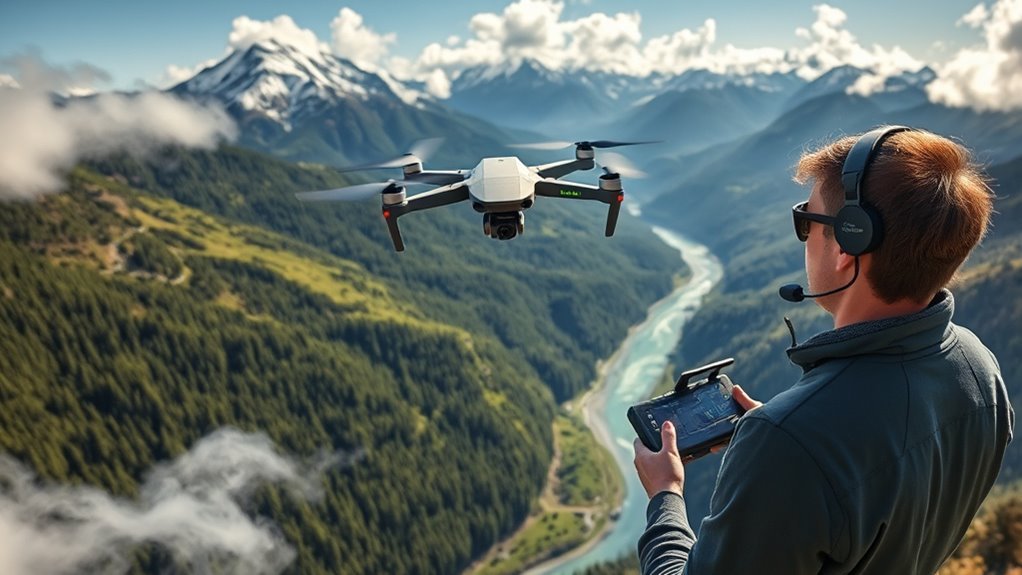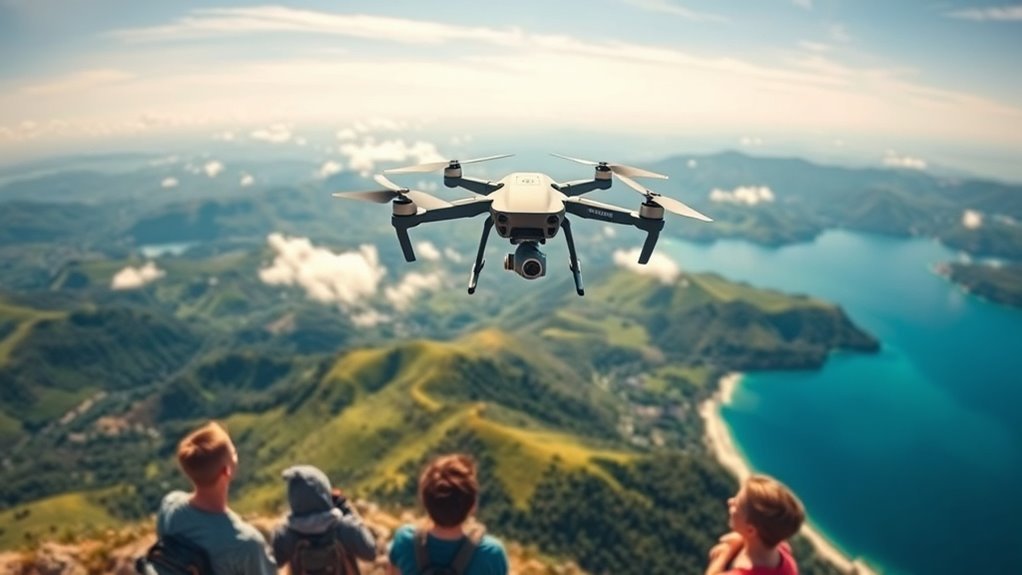As a drone pilot, you’ve got access to stunning aerial photography and videography, capturing perspectives that traditional methods can’t match. This role opens numerous career paths across industries like agriculture and real estate, allowing you to influence markets considerably. You’ll also enhance your technical skills, gaining expertise in flight mechanics and data interpretation. These perks not only elevate your employability but also inspire innovative problem-solving. Discover how your journey can expand further.
Captivating Aerial Photography and Videography

As you explore the world of drone piloting, you’ll find that enchanting aerial photography and videography offer unique perspectives that traditional methods simply can’t match. By leveraging advanced drone technology, you can capture stunning images that reveal intricate details of creative landscapes. This capability transforms your work into compelling aerial storytelling, allowing you to convey narratives that engage and inspire viewers. The latest models, like the DJI Air 3, provide versatile dual cameras that enhance your ability to capture a variety of stunning shots.
The versatility of drones enables you to access hard-to-reach locations, enhancing your ability to document diverse environments. With features like high-resolution cameras and stabilization systems, your imagery will be both dynamic and professional. As you refine your skills, you’ll not only enjoy the freedom of flight but also elevate your artistic vision, making each project an opportunity for innovation and expression. Additionally, utilizing NDAA compliance ensures that your equipment meets security standards for sensitive filming environments.
Expanding Career Opportunities Across Industries

While many associate drone piloting with recreational use, the reality is that this skill opens a myriad of career opportunities across diverse industries. You can leverage your piloting expertise in sectors like agricultural monitoring, where drones enhance crop analysis, or in real estate marketing, where aerial views give properties a competitive edge. Furthermore, advancements in crop geofencing technology allow for even greater precision in agricultural applications, ensuring efficient and safe operations. Additionally, expert instructors provide targeted career guidance, helping you navigate the diverse pathways available in the drone industry.
| Industry | Career Role | Benefits |
|---|---|---|
| Agriculture | Drone Agronomist | Precision farming benefits |
| Real Estate | Aerial Marketing Specialist | Enhanced property visibility |
| Construction | Site Surveyor | Improved project oversight |
| Film and Media | Aerial Cinematographer | Unique storytelling angles |
Each role not only utilizes your piloting skills but also empowers you to forge a fulfilling career path.
Enhancing Technical Skills and Knowledge

Acquiring drone piloting skills not only opens career avenues but also enhances your technical knowledge in various domains. You’ll explore flight mechanics, understanding the principles governing aerodynamics, stability, and control. This foundational knowledge is essential for safe and effective piloting. Additionally, you’ll gain software proficiency, learning to navigate advanced drone operating systems and data analysis tools. These skills allow you to interpret aerial imagery and manage flight operations efficiently. As you master these technical aspects, you’ll not only increase your employability but also empower yourself to innovate within the field. Ultimately, this blend of flight mechanics and software expertise fosters freedom in your projects, enabling you to tackle complex challenges and explore new frontiers in drone technology. Moreover, understanding real-time data processing will enhance your ability to make swift, informed decisions during operations, especially when leveraging advanced analytics to uncover environmental patterns.
Frequently Asked Questions
What Are the Legal Requirements to Become a Drone Pilot?
To become a drone pilot, you’ll need to understand drone regulations and obtain a pilot certification. This involves passing a knowledge test, demonstrating operational competency, and adhering to safety and airspace rules to guarantee compliance.
How Do I Choose the Right Drone for My Needs?
To choose the right drone, evaluate essential drone features like camera quality and flight time, while balancing your budget considerations. Prioritize what’s vital for your needs to guarantee you get the best value for your investment.
Can I Fly Drones for Recreational Purposes Without Certification?
You can’t just hop on your drone like it’s 1999! In most places, you can fly for recreational purposes without certification, but you must follow drone regulations to guarantee safety and compliance.
What Are the Most Common Drone-Related Safety Concerns?
When flying drones, you need to contemplate collision avoidance and privacy concerns. Ensuring your drone’s sensors are functional helps prevent accidents, while respecting others’ privacy fosters trust and maintains freedom in the skies.
How Can I Network With Other Drone Pilots and Professionals?
To get your foot in the door, join online forums and attend local meetups. Engaging with other drone pilots and professionals in these spaces can open doors and enhance your knowledge and connections immensely.

